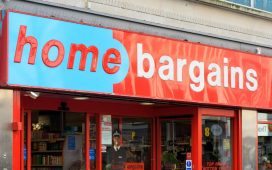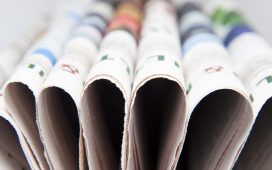Unlock the Editor’s Digest for free
Roula Khalaf, Editor of the FT, selects her favourite stories in this weekly newsletter.
Like a band back for another encore, or a boxer refusing to be counted out, Vince Power would never call it quits. He built an empire of concert venues and festivals that made him one of the main players in UK live music; and then started from scratch again after it collapsed. Triumphs and setbacks were different sides of the same gambler’s coin for the promoter, who has died aged 76. “I’ll retire when I’m six months dead,” he joked in a newspaper profile in 2004.
At his peak, Power owned some of London’s best-known venues through his Mean Fiddler organisation and was linked to major festivals including Reading and Glastonbury. The events he put on ranged from up-and-comers in spit-and-sawdust dives to the biggest stars performing for vast audiences. The self-described “godfather of gigs” anticipated the festival boom of the 1990s and transformed the “live offering” of concertgoing, in the whiteboard phraseology of marketing. Yet he also proved too maverick for the corporatised sector that he helped to usher in.
He was born in 1947 in County Waterford, Ireland. It was a hard upbringing. Of his 10 siblings, four didn’t survive infancy. One was Power’s twin sister, who died soon after birth. At 15, he was sent to England to live with a strict aunt who ran a boarding house in Hertfordshire. “I was sad on the boat. My mother was very upset,” he recalled in 2016.
London would become his home from home, the place where a rural Irish boy could turn himself into a multi-millionaire impresario with an honorary CBE from the Queen. Like many Irish immigrants in the 1960s, he found work in construction. House clearances led him to the second-hand furniture trade, which in turn underwrote his purchase of the Mean Fiddler — a drinking den in Harlesden, an un-fancy area in the city’s northwestern suburbs.
Inspired by bars visited during a trip to Nashville, Power revamped the Mean Fiddler as a country music venue, opening in 1982. He claimed to have been one of the first importers of Budweiser beer to the UK. A musical coup came when Johnny Cash played a gig in 1986. The first non-country act to play was The Pogues, the greatest of London-Irish bands. Their appearance caused the house DJ to resign in a fit of purist fury.
Power lived and breathed music himself, but he wasn’t dogmatic about it. “Once I’d got rid of my own personal tastes, it began to work very well,” he said of his booking policy at the Mean Fiddler. The same philosophy underpinned his expansion into other London venues, including the Jazz Café, the Astoria and the Forum. At its peak, the Mean Fiddler group operated 27 venues catering for different audiences.
In 1989, Power took over a mainstay in the UK music calendar, the Reading festival, which was floundering after adopting a more chart-friendly line-up: the previous year, the singer Meat Loaf had come under a bombardment of urine-filled plastic bottles while performing. Power gave it a sharper indie-rock identity. In 1997, he brokered a groundbreaking £6mn sponsorship deal with Carling beer. Two years later, he launched a northern English adjunct to the Reading festival in Leeds.
He had an inexhaustible drive to seek out new opportunities. Many of the festivals that mushroomed in the 1990s bore his fingerprints, such as the legal rave Tribal Gathering and the Irish music-themed Fleadh. In 2002, Mean Fiddler took a stake in a five-year deal with Glastonbury, a marquee name in danger of losing its licence due to overcrowding by gatecrashers. After selling his business for £38mn in 2005, partly to Clear Channel, forerunner of the US promoting giant Live Nation, Power became involved with the Benicàssim festival in Spain.
Belied, or perhaps enhanced, by his quietly spoken manner, Power had a fearsome business reputation. “I’m two extremes. I’m very soft and I’m very hard, and I’m trying to find the middle ground,” he explained in 2001. His risk-taking brought success but could also backfire, as with Prince’s ruinously expensive headline appearance at his Hop Farm festival in 2011. “I put it on and lost a fortune. But anyway, it was a great night,” he said.
In 2012, his company Vince Power Music Group went into liquidation, reportedly losing him £9mn of his own money. As ever, he clambered back on to his feet. In 2020, he bought Dingwalls, a small but iconic venue in Camden, one of London’s live music hubs. “All I need is a good shower that works and clean sheets,” he said. “That’s all you need in life.”










